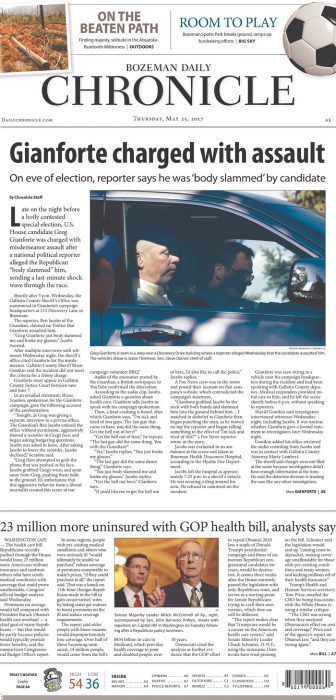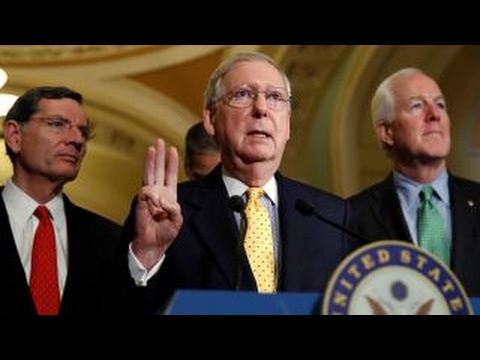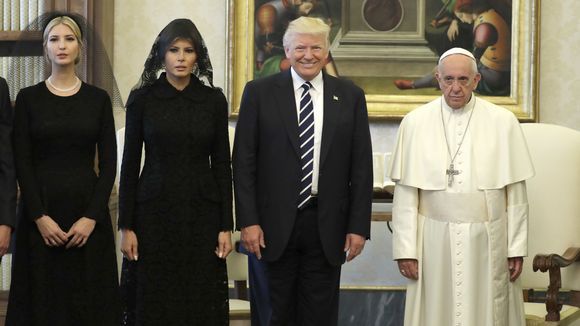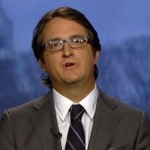While leading Democrats gleefully – and naively – rub their palms together, anticipating that obstruction of justice charges and impeachment are just around the corner for President Trump, the Republicans can’t catch a break, with bad news pouring in from all directions.
Let’s take a look at the full run-down of news reports over the past 36 hours:
- The election-eve revelations about Montana GOP congressional candidate Greg Gianforte, who apparently body-slammed and punched a reporter (and now faces assault charges) are so bad that congressional Republicans from all quarters are denouncing him.
It’s so disastrous that when the results come in tonight from the closely watched special election, pundits are wondering if it would be better for the Republican Party if Gianforte lost. That way, they can dismiss the defeat in Red State Montana by claiming he was a terrible candidate – someone who Trump might describe as a “nut job.” If he wins, Gianforte, who was already battling mediocre voter-approval ratings, could become a weight on the shoulders of GOP leadership all the way to November 2018.
- The Congressional Budget Office projections for the House-passed American Health Care Act (AHCA) are so bad that it seems inconceivable that, if Speaker Paul Ryan had delayed the House vote until the CBO score was revealed, the bill would have survived.
Here are the key numbers: 23 million people would lose their health insurance, including 14 million in the first year; the number of uninsured would nearly double by 2026, compared to the current path under Obamacare; elderly and poor people would see their insurance premiums skyrocket by 850 percent over the next decade; contrary to promises of cheaper coverage, the bill would hit a 64-year-old earning a modest income with an annual premium of between $13,600 and $16,100 within a decade.

Today’s front page of Montana’s top newspaper
What’s more, the CBO goes out on a bit of limb to project that one-sixth of the U.S. population resides in states that the CBO expects would drastically alter the preexisting-condition requirement. That means many of those people with chronic medical problems would be priced out of the market.
While these are projections, two things seem certain. The Rose Garden celebration of the House’s narrow AHCA passage by Trump and Republican lawmakers on May 4 now seems wholly ridiculous. And the prospects of the Senate GOP cobbling together a bill that is remotely similar now seems highly unlikely.
- Former FBI director James Comey may have been influenced by a Russian document that was misleading or fake when he chose to publicly chastise Hillary Clinton in July for relying on a private email server while she was secretary of state.
The Russian document cited a supposed email describing how then-Attorney General Loretta Lynch had privately assured someone in the Clinton campaign (or perhaps former president Bill Clinton) that the email investigation would not push too deeply into the matter.
Here’s how The Washington Post reported this development:
“Current and former officials have said that Comey relied on the document in making his July decision to announce on his own, without Justice Department involvement, that the investigation was over. That public announcement — in which he criticized Clinton and made extensive comments about the evidence — set in motion a chain of other FBI moves that Democrats now say helped Trump win the presidential election…
“But according to the FBI’s own assessment, the document was bad intelligence — and according to people familiar with its contents, possibly even a fake sent to confuse the bureau. The Americans mentioned in the Russian document insist they do not know each other, do not speak to each other and never had any conversations remotely like the ones described in the document. Investigators have long doubted its veracity, and by August the FBI had concluded it was unreliable.”
- Attorney General Jeff Sessions concealed his contacts with Russian officials when filling out his basic security clearance form to be the nation’s highest-ranking law enforcement official. Sessions has already come under fire for failing to tell lawmakers that he met twice with Russian Ambassador Sergey Kislyak, a close ally of Russian Vladimir Putin and a suspected purveyor of intelligence material, during the 2016 presidential election.
The form requires anyone applying for a federal security clearance to list “any contact” that he or his family had with a foreign government or its representatives over the past seven years.
- The U.S. debt ceiling will be reached far sooner than Republicans leaders had hoped. Budget Director Mick Mulvaney revealed the bad news on Wednesday that tax receipts are coming in “slower than expected” and that the federal government could run out of cash months before what was previously anticipated. Treasury Secretary Steven Mnuchin echoed those concerns, telling House members to raise the debt limit before they leave for the summer. An intraparty feud with the House Freedom Caucus (tea party Republicans) now looms large.
- Carrier, the company Trump promised “100 percent” to keep in America, announced that it will soon cut 632 workers from its Indianapolis factory. The manufacturing jobs will move to Monterrey, Mexico, where the minimum wage is $3.90.
The CEO of Carrier’s parent company had said that the jobs saved in Indianapolis would eventually be replaced by automation and robotics. But this quick turnabout is much worse news for the president, who treated the manufacturer’s bow to him as a feather in his cap, even before he took office.
- A federal appeals court refused to reinstate President Trump’s revised travel ban, saying it “drips with religious intolerance, animus and discrimination,” according to the New York Times.
The 10-3 decision, from the Fourth Circuit of the U.S. Court of Appeals in Richmond, Va., was a fresh bad-news setback for the administration’s efforts to limit travel from several predominantly Muslim countries.
Writing for the majority, Chief Judge Roger Gregory said Trump’s statements on the campaign trail concerning Muslims showed that the revised order was the product of religious hostility. Such discrimination, he wrote, violates the First Amendment’s ban on government establishment of religion.
On his first presidential trip overseas, Trump started out strong by delivering a speech in Saudi Arabia amidst numerous Arab leaders that proposed a potential gamechanger – a Mideast coalition to wipe out terrorism. The president’s critics were dismayed that his comments in Riyadh, which contradicted candidate Trump’s missives against Muslim leaders and the Saudis in particular, did not produce widespread howls of hypocrisy.
Trump’s brief stop in Israel was surprisingly uneventful, even as the president continues to believe that unprecedented peace between the Israelis and Palestinians is within reach. Whatever vitriol the Israelis harbor for Trump due to his dangerous sharing of intelligence with the Russians, it was never on display.
On a more superficial level, the president’s meeting with Pope Francis at the Vatican and his stop at the new NATO headquarters in Brussels produced a series of viral social media posts that certainly delighted his Democratic detractors.
First, press secretary Sean Spicer, a devout Catholic, was blocked from the papal event, apparently out of spite. Next, the meeting with a dour-faced pope produced an inexplicable photo opp in which Melania and Ivanka Trump wore all-black outfits and strange choices of headdress. Frankly, Melania looked like a lady “from the old country” at a funeral.
And then we have Trump in a NATO slow-mo – a GIF (@CillizzaCNN) that shows him elbowing past other foreign dignitaries and puffing out his chest while flashing a self-satisfied smirk as he took his position in the center of the camera frame.











